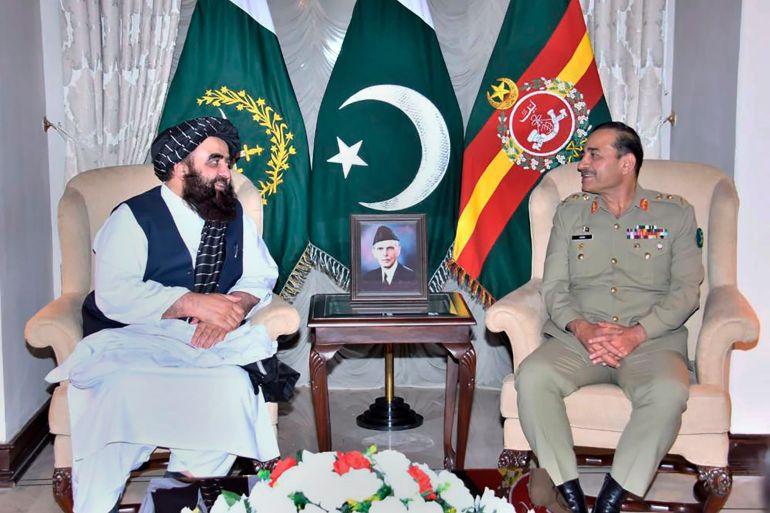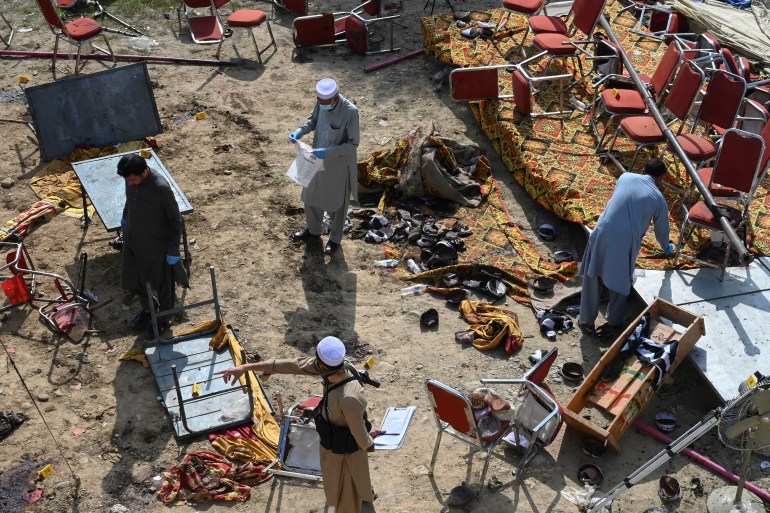Taliban’s ties with Pakistan fraying amid mounting security concerns
Two years since the Taliban took over Afghanistan, ties between the neighbours have deteriorated amid a rise in armed attacks.

Islamabad, Pakistan – As the Afghan Taliban celebrated two years of their control over Afghanistan on August 15, their relationship with Pakistan, their longtime ally and neighbour, looks increasingly fraught.
Islamabad is blaming Kabul for a string of deadly attacks in Pakistan’s tribal region bordering Afghanistan. The latest attack, a suicide bombing in Bajaur district in late July, which killed more than 54 people, was claimed by an ISIL (ISIS) affiliate – the Islamic State in Khorasan Province (ISKP or ISIS-K).
Keep reading
list of 4 itemsTaliban Palace: The second year of Taliban rule in Afghanistan
Taliban marks two years since return to power in Afghanistan
Afghan activist challenges Taliban spokesman on girls’ education
Top Pakistani officials have accused the ruling Taliban administration of not doing enough to control the movement of armed groups from crossing the porous border.
“We will act under international law to defend ourselves. If the Afghan authorities don’t act, then action inside can be one of the options but not the first option,” Bilawal Bhutto Zardari, the then-Pakistani foreign minister, said days after the Bajaur blast that targeted a political function.
Pakistani army chief General Syed Asim Munir also condemned the “involvement of Afghan nationals” in conducting attacks on Pakistani soil, calling it “detrimental to regional peace and stability” a week after the Bajaur attack.
He pointed out that the attacks emanating from Afghan soil were a “deviation” from the 2020 Doha Peace Agreement between the Taliban and the United States, under which the Afghan group promised not to allow armed groups to operate on its territory.
Taliban refutes Pakistani allegations
However, the Taliban administration, which condemned the Bajaur blast, has continued to refute the Pakistani allegations.
“After the recent security incident in Pakistan, officials have once again blamed Afghans instead of strengthening the security of their country,” Zabihullah Mujahid, chief spokesman for the Taliban administration, said in a statement issued last week.

“The Islamic Emirate of Afghanistan once again emphasises that it is not in favour of any attack on Pakistan and we will not allow anyone to use the soil of Afghanistan against Pakistan. However, it is not our responsibility to prevent and control attacks inside the territory of Pakistan,” Mujahid added.
The war of words captures the rapidly deteriorating ties between the two countries, as Pakistan faces increasing attacks on its law enforcement personnel as well as the general public.
According to official data, the province of Khyber Pakhtunkhwa, which includes Bajaur, has been rocked by more than 300 attacks in 2023 alone, with a vast majority of them claimed by the Tehreek-e-Taliban Pakistan (TTP), an outlawed group also known as Pakistan Taliban.
The TTP was founded in 2007 and is ideologically aligned with the Afghan Taliban but it appears to operate separately. Among its many demands, the Pakistan Taliban seeks stricter enforcement of Islamic laws, the release of its members in government custody, and a reduced Pakistani military presence in parts of Khyber Pakhtunkhwa.
Brigadier Saad Muhammad, a former Pakistani military official who also served as a defence attache to Afghanistan, said more than 90 percent of attacks in the last couple of years were linked to the TTP.
As the Taliban has repeatedly denied its role in the attacks, Muhammad said he could not see the two neighbours becoming friends in the “foreseeable future” as they continued to engage in a blame game.
“At best, the two nations can hope to manage relations, but nothing beyond that,” he told Al Jazeera.
A high-level talks
Amira Jadoon, a counterterrorism scholar with a focus on Pakistan and Afghanistan, said the Bajaur attack would only further exacerbate tensions between the two nations.
Jadoon, an assistant professor at Clemson University in the United States, said while Pakistan expected the Taliban government to crack down on the TTP, the Taliban had failed to act decisively.
She added that ISKP continued to gain strength in Pakistan’s tribal border areas, while remaining relatively less active in Afghanistan, giving credence to a perception that anti-Pakistan fighters can find havens in Afghanistan.
“Pakistan’s frustration with the Taliban has steadily grown, regardless of whether the Taliban is seen as passive or constrained.
“Bhutto-Zardari’s recent statements reflect Pakistan signalling this frustration more assertively, perhaps in hopes of compelling the Taliban to take its warnings more seriously,” she told Al Jazeera.
A high-level delegation led by then-Defence Minister Khawaja Asif travelled to Kabul for talks in February, followed by a visit by Afghan Foreign Minister Amir Khan Muttaqi to Islamabad in May.
But the discussions have not reduced the violence, with the TTP launching more than 90 attacks in the month of July alone. Jadoon said the TTP posed a particular quandary for the Afghan Taliban due to the groups’ historical ties, shared backgrounds and sympathy for them among some Taliban members.
“With regards to constraining ISKP, the Taliban certainly have the capacity to conduct targeted killings of its top commanders – but it is less clear whether the Taliban have the capacity to maintain sustained pressure to the extent that it can degrade ISKP operationally in the long term,” she added.
Pakistan, meanwhile, is seen to be re-engaging with the United States to deal with regional security threats. General Michael Erik Kurilla, who leads the United States Central Command, met Pakistan’s army chief last month during his second visit to the South Asian country in seven months.
According to a Pakistani military statement, the officials discussed matters pertaining to the “regional security situation and defence cooperation”.
Nizam Salarzai, an Islamabad-based researcher with a focus on unrest in the country’s tribal belt, said that for Pakistan, the TTP would always be a major concern, from a counterterrorism standpoint.
“The Americans have been treating it like a localised matter till now. The Afghan Taliban are also saying that their talks in Doha did not include matters pertaining to Pakistan, and they, too, want to paint the concerns about TTP as Pakistan’s internal matter,” Salarzai told Al Jazeera.